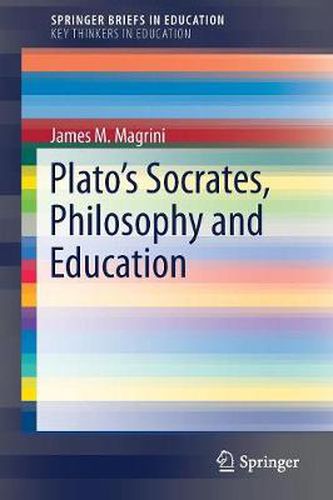Readings Newsletter
Become a Readings Member to make your shopping experience even easier.
Sign in or sign up for free!
You’re not far away from qualifying for FREE standard shipping within Australia
You’ve qualified for FREE standard shipping within Australia
The cart is loading…






This title is printed to order. This book may have been self-published. If so, we cannot guarantee the quality of the content. In the main most books will have gone through the editing process however some may not. We therefore suggest that you be aware of this before ordering this book. If in doubt check either the author or publisher’s details as we are unable to accept any returns unless they are faulty. Please contact us if you have any questions.
This book develops for the readers Plato’s Socrates’ non-formalized philosophical practice of learning-through-questioning in the company of others. In doing so, the writer confronts Plato’s Socrates, in the words of John Dewey, as the dramatic, restless, cooperatively inquiring philosopher of the dialogues, whose view of education and learning is unique: (1) It is focused on actively pursuing a form of philosophical understanding irreducible to truth of a propositional nature, which defies transfer from practitioner to pupil; (2) It embraces the perennial on-the-wayness of education and learning in that to interrogate the virtues, or the good life, through the practice of the dialectic, is to continually renew the quest for a deeper understanding of things by returning to, reevaluating and modifying the questions originally posed regarding the good life. Indeed Socratic philosophy is a life of questioning those aspects of existence that are most question-worthy; and (3) It accepts that learning is a process guided and structured by dialectic inquiry, and is already immanent within and possible only because of the unfolding of the process itself, i.e., learning is not a goal that somehow stands outside the dialectic as its end product, which indicates erroneously that the method or practice is disposable. For learning occurs only through continued, sustained communal dialogue.
$9.00 standard shipping within Australia
FREE standard shipping within Australia for orders over $100.00
Express & International shipping calculated at checkout
This title is printed to order. This book may have been self-published. If so, we cannot guarantee the quality of the content. In the main most books will have gone through the editing process however some may not. We therefore suggest that you be aware of this before ordering this book. If in doubt check either the author or publisher’s details as we are unable to accept any returns unless they are faulty. Please contact us if you have any questions.
This book develops for the readers Plato’s Socrates’ non-formalized philosophical practice of learning-through-questioning in the company of others. In doing so, the writer confronts Plato’s Socrates, in the words of John Dewey, as the dramatic, restless, cooperatively inquiring philosopher of the dialogues, whose view of education and learning is unique: (1) It is focused on actively pursuing a form of philosophical understanding irreducible to truth of a propositional nature, which defies transfer from practitioner to pupil; (2) It embraces the perennial on-the-wayness of education and learning in that to interrogate the virtues, or the good life, through the practice of the dialectic, is to continually renew the quest for a deeper understanding of things by returning to, reevaluating and modifying the questions originally posed regarding the good life. Indeed Socratic philosophy is a life of questioning those aspects of existence that are most question-worthy; and (3) It accepts that learning is a process guided and structured by dialectic inquiry, and is already immanent within and possible only because of the unfolding of the process itself, i.e., learning is not a goal that somehow stands outside the dialectic as its end product, which indicates erroneously that the method or practice is disposable. For learning occurs only through continued, sustained communal dialogue.